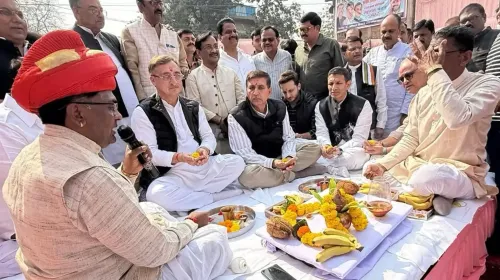Has the Govt Achieved a Milestone in Allocating 200 Coal Blocks for Commercial Mining?

Synopsis
Key Takeaways
- 200th Coal Mine allocated for commercial mining.
- Focus on private sector participation.
- Efforts to reduce import dependence.
- Implementation of a single-window clearance system.
- Enhancement of transparency and governance in coal mining.
New Delhi, June 17 (NationPress) The Ministry of Coal announced a significant advancement in economic reforms aimed at commercial mining with the allocation of its 200th Coal Mine. This milestone highlights the ongoing efforts to revolutionize India’s coal industry.
“The allocation of the Marwatola–II coal block to Singhal Business Private Limited emphasizes the Ministry’s dedication to driving reforms, encouraging private investment, and enhancing national self-reliance in coal production. This achievement marks a step towards establishing a more resilient, transparent, and future-ready coal ecosystem,” the Coal Ministry stated.
The Coal Ministry reiterated its commitment to fostering an investment-friendly environment, minimizing bureaucratic hurdles, and accelerating the operational readiness of coal blocks nationwide.
This achievement reflects the Ministry’s forward-thinking strategy aimed at not only boosting domestic coal output but also recalibrating the country’s energy matrix by diminishing import reliance and fortifying long-term energy security. Such initiatives contribute significantly to economic growth and strategic autonomy, according to the statement.
In recent years, the Ministry has implemented a range of transformative reforms, including the initiation of commercial coal mining and the establishment of a single-window clearance system, alongside digital monitoring and governance enhancements. These changes have redefined the coal sector's operational framework, unlocking new opportunities for private engagement and ensuring a more transparent, accountable, and future-focused resource development framework.
The Nominated Authority of the Coal Ministry also commenced the bidding process for the 12th round of commercial coal block auctions, receiving a total of 41 bids, both online and physical, for 11 coal blocks.
The online bids were decrypted and disclosed electronically in the presence of bidders, followed by the opening of sealed envelopes containing offline bid documents. The entire process was transparently displayed on screen for all participants, as stated.
Among the companies that submitted bids are Damodar Valley Corporation, Amalgam Steel and Power Ltd, NLC India Limited, Oriental Quarries and Mines Pvt Ltd, Jindal Steel and Power Limited, Orissa Alloy Steel Pvt Ltd, Penna Shipping Limited, and Jharkhand Exploration and Mining Corporation Limited.
A total of 38 bids were received for 8 coal blocks in this 12th round.









